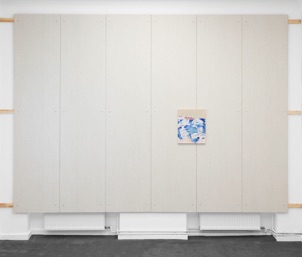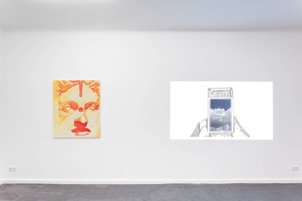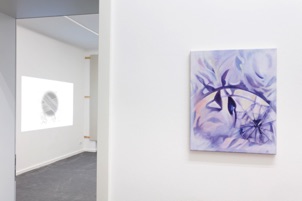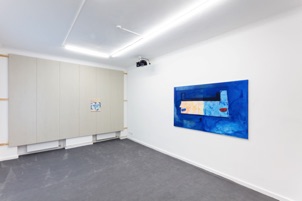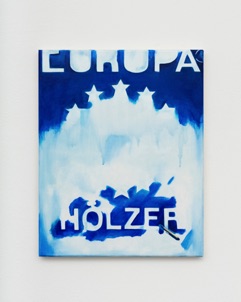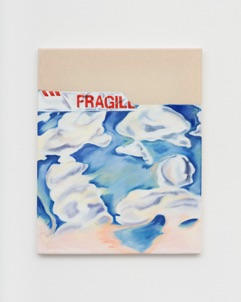NATALIA ROLÓN
The Logical Song
July 30th - September 4th
Opening Thursday, July 29th, 11am - 7pm
Psychoanalysis might just be to Argentinians what the Zodiac is to queer people in L.A.: a constant topic of conversation, a real yardstick in one's life. At once elevator music, melodrama and absolute truth. Natalia Rolón grew up in Buenos Aires and has a background in the film industry. She is also a great music lover. Biography affects an artist’s work in complicated ways. Still, I’ll suggest, in Rolón’s work, the logic of pop songs and cinema meets the logic of psychoanalysis. That is to say, lyrical hooks, ear bugs, and beautiful, crafted narrative arcs collide with the fundamental impossibility of any kind of narrative at all. Psychoanalysis renders all narratives – indeed all coherence and plausibility – deeply suspect. They hide more than they seek. History begins to sound like a fiction, and fiction begins to sound peculiarly wishful. As such, the logic of Rolón's work is an illogic that puts images (and music) to the gripping story of the problem of story-telling.
As an exhibition, The Logical Song is both a mixtape and a filmic collage: each painting is a jump cut – a disruption to temporality – but without a contrast shot; we are never allowed the ground of perspective, or of place. In a similar way to how psychoanalysis is not about discovering what happened, or even if it happened at all, but about how it was worked into the patient's mind, here is a body of work preoccupied with how to describe time in relation to objects, light, colour and shadow – in one word: language – and how to capture it inside a picture. This, of course, is an impossible, futile endeavour for which Rolón stages an absurdist drama with no protagonist and a series of false endings.
Childhood, as Freud described it, informed everything but predicted nothing. Human development was riddled with paralysing repetitions. Sexuality obsessed us, but what an obsession with sex was an obsession about was unclear. I do, I do, I do, I do, I do pictures the sci-fi fantasy that the existential question of how to be fully awake in the world might be solved by taking a pill, and the hilarity that even this desire for a thrown, unsheltered existence should be organised into a weekly pill dispenser. It is also a picture of the up-in-the-airness of everything. Like a pile of dishes that never collapses in the harsh light of a dusk that never ends (Endless, Endless IV), there is no fall-out, no decision. The certainty implied by its title never settles in this painting, as, in fact, it doesn't in ABBA's music either. Theirs is an oeuvre characterised by seeing things from a distance, or obliquely, always longing, or too late. This might have something to do with the fact that the songs were written by men for women – just as Freud wrote psychoanalysis in conversation with men but about women – manifesting an a priori sense of displacement.
To always be singing someone else's song – though not always literally – is a kind of modus operandi in Rolón’s work, which accounts for that soft brand of melancholy that tends to accompany absurdity. (As with any loss, the loss of sense requires mourning, too.) But this modus of the alienated and self-conscious story-teller is also one of performativity, humour, camp. If Rolón’s work belonged anywhere on a face it would be in the glimmer of the eye. Her paintbrush is tiny and agile and hovers just above the canvas like it could go anywhere, like it may just as well never touch it at all. A persistent sense of limbo, and the feeling that the real subject of the painting is just outside of the frame render the works, to use Freud’ word, overdetermined: of multiple causes, never just about one thing. Freud wrote that analysis only really gets going when the patient descends to minute detail from the well-wrought recollections which are their surrogate. In Rolón’s work, tension derives from how uncertainty is sustained through execution. It is a battle between creation and potential – a question of how to assert while continuing to flicker the answer to which is the detail: an extraordinary honing in, not just on an object but a moment. This time-space becomes so precise, so concentrated there is no room for desire only its frightful absence, pure suspense: a game, a hall of mirrors, a drop that falls and never hits the ground.
Kristian Vistrup Madsen
Natalia Rolón (*Buenos Aires. Lives and works in Berlin) studied at the Städelschule, Frankfurt am Main (Michael Krebber Class) and currently pursues an MFA from the Milton Avery Graduate School of the Arts, Bard College, NY. She holds a diploma in Diseño de Imagen y Sonido (Film) from the Universidad de Buenos Aires. Natalia Rolón has exhibited in Europe, USA and Latin America. Recently her works have been featured at Haus Wien, Vienna; Spoiler, Berlin; Pauline Perplexed, Paris; Castiglioni, Milan; Hester, New York; Portikus (in the context of Otobong Nkanga’s solo show), Frankfurt Am Main; Big Sur Gallery, Buenos Aires; a.o.
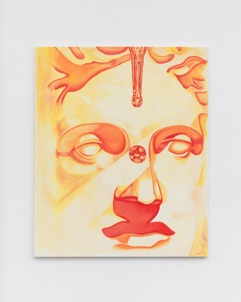
Ph: Marjorie Brunet Plaza
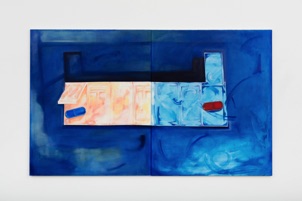
Ph: Marjorie Brunet Plaza
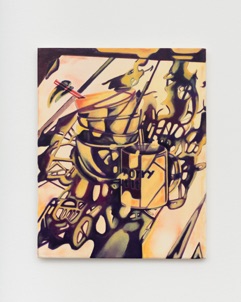
Ph: Marjorie Brunet Plaza

